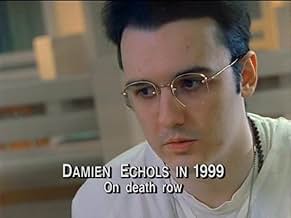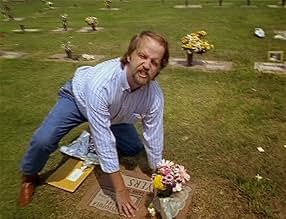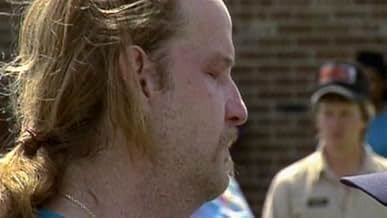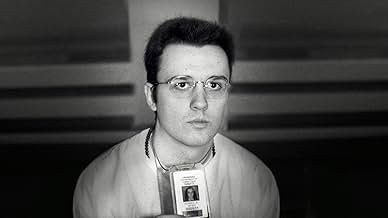Paraíso perdido 2: revelaciones
Título original: Paradise Lost 2: Revelations
PUNTUACIÓN EN IMDb
7,5/10
9,9 mil
TU PUNTUACIÓN
Añade un argumento en tu idiomaThe case of the West Memphis Three, its questionable circumstances and the parties involved are followed up years later.The case of the West Memphis Three, its questionable circumstances and the parties involved are followed up years later.The case of the West Memphis Three, its questionable circumstances and the parties involved are followed up years later.
- Nominado para 1 premio Primetime Emmy
- 2 premios y 1 nominación en total
Melissa Byers
- Self
- (metraje de archivo)
Tim Sullivan
- Self
- (sonido de archivo)
Jessie Misskelley
- Self
- (as Jessie Miskelly)
Argumento
¿Sabías que...?
- CuriosidadesThe only film of the trilogy to be a TV project instead of receive a theatrical release.
- PifiasAt one point the on-screen date for a trial scene is listed as January of 1993. The murders didn't occur until May of that year.
- ConexionesFeatured in Paradise Lost 3: Purgatorio (2011)
- Banda sonoraWelcome Home (Sanitarium)
Performed by Metallica
Written by James Hetfield, Lars Ulrich, and Kirk Hammett
Produced by Flemming Rasmussen with Metallica
Reseña destacada
Generally riveting follow up of the case where three quite possibly innocent young men sit in prison for murdering three children.
Certainly, at least given what the two documentaries show, there is way beyond 'reasonable doubt' that they're responsible. But what was a moderate flaw in the first film becomes worse here; In the same way the prosecution disturbingly made the evidence fit their theory, throwing out, ignoring, or belittling what didn't fit, the film-makers seem to play some of the same game in reverse.
Crucial questions about alibis are never answered, and this sequel spends too much energy trying to pin guilt on Mark Byers, step-father of one of the murdered boys.
Is there some spooky circumstantial evidence that he may have been involved? Absolutely. But proof? The man even voluntarily takes a lie detector test, and passes with flying colors, which the film- makers then dismiss since the man is on various prescription mood altering drugs. But do we ever hear an expert say those drugs might affect the test? No.
More disturbing, the film seems to imply he's guilty because he looks and acts weird, and says confusing and contradictory things, the very sort of 'guilt by odd behavior' association both films attack in relation to the three boys found guilty. The fact that Byers (supposedly) has a brain tumor, and what effect that might have on his outward behavior is never explored at all. And watching this character at such length starts to get dull after a while, as his rants go on and on.
None-the-less, this is still a very interesting film, the most moving sections being those spent with the three now young men in jail for a crime they likely didn't commit. All have grown up a great deal in the 4 years since the last film, and are sad and articulate reminders of how horrifying it can be that people never given the benefit of a fair trial are allowed to sit and rot in prison. And the amazing lack of despair or bitterness they show is a testament to human resilience.
Certainly, at least given what the two documentaries show, there is way beyond 'reasonable doubt' that they're responsible. But what was a moderate flaw in the first film becomes worse here; In the same way the prosecution disturbingly made the evidence fit their theory, throwing out, ignoring, or belittling what didn't fit, the film-makers seem to play some of the same game in reverse.
Crucial questions about alibis are never answered, and this sequel spends too much energy trying to pin guilt on Mark Byers, step-father of one of the murdered boys.
Is there some spooky circumstantial evidence that he may have been involved? Absolutely. But proof? The man even voluntarily takes a lie detector test, and passes with flying colors, which the film- makers then dismiss since the man is on various prescription mood altering drugs. But do we ever hear an expert say those drugs might affect the test? No.
More disturbing, the film seems to imply he's guilty because he looks and acts weird, and says confusing and contradictory things, the very sort of 'guilt by odd behavior' association both films attack in relation to the three boys found guilty. The fact that Byers (supposedly) has a brain tumor, and what effect that might have on his outward behavior is never explored at all. And watching this character at such length starts to get dull after a while, as his rants go on and on.
None-the-less, this is still a very interesting film, the most moving sections being those spent with the three now young men in jail for a crime they likely didn't commit. All have grown up a great deal in the 4 years since the last film, and are sad and articulate reminders of how horrifying it can be that people never given the benefit of a fair trial are allowed to sit and rot in prison. And the amazing lack of despair or bitterness they show is a testament to human resilience.
- runamokprods
- 23 jun 2012
- Enlace permanente
Selecciones populares
Inicia sesión para calificar y añadir a tu lista para recibir recomendaciones personalizadas
Detalles
- Fecha de lanzamiento
- País de origen
- Idioma
- Títulos en diferentes países
- Paradise Lost 2: Revelations
- Localizaciones del rodaje
- Empresas productoras
- Ver más compañías en los créditos en IMDbPro
- Duración2 horas 10 minutos
- Color
Contribuir a esta página
Sugerir un cambio o añadir el contenido que falta

Principal laguna de datos
By what name was Paraíso perdido 2: revelaciones (2000) officially released in Canada in English?
Responde























